List of heads of government of Yemen
The following is a list of the heads of government of modern Yemen, from the establishment of the Mutawakkilite Kingdom of Yemen in 1918 to the present day.
| This article is part of series on |
.svg.png.webp) |
|---|
|
|
|
|
Yemen is in a tumultuous state since the start of the Arab Spring-related Yemeni Crisis in 2011; the crisis resulted in the resignation of President Ali Abdullah Saleh in 2012, after 33 years in power.[1] The presidency was then transferred to Vice President Abdrabbuh Mansur Hadi. Since 2014–2015, the country has been in a civil war (alongside the Saudi Arabian–led military intervention aimed at restoring Hadi's government after the Houthi takeover) with several proto-state entities claiming to govern Yemen: the internationally recognized Cabinet of Yemen/Presidential Leadership Council, the Houthi-led Supreme Revolutionary Committee/Supreme Political Council, and the secessionist Southern Transitional Council.[2][3][4][5][6]
Mutawakkilite Kingdom of Yemen (1918–1970)
| Portrait | Prime Minister (Birth–Death) |
Term of office | Political party | Imam (Reign) | |||
|---|---|---|---|---|---|---|---|
| Took office | Left office | Time in office | |||||
 |
Ibrahim bin Yahya Hamid al-Din (1915–1948) |
17 February 1948 | 18 February 1948 | 1 day | Independent | Ahmad bin Yahya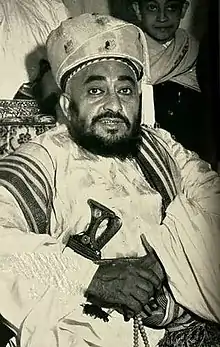 (1948–1962) | |
 |
Ali ibn Abdullah al-Wazir (1900–1980) |
February 1948 | April 1948 | 2 months | Independent | ||
.jpg.webp) |
Hassan ibn Yahya (1908–2003) |
April 1948 | 18 June 1955 | 7 years, 2 months | Independent | ||
| Vacant (18 June 1955 – 28 September 1962) | |||||||
Mutawakkilite Kingdom of Yemen in Exile (1962–1970)
| Portrait | Prime Minister (Birth–Death) |
Term of office | Political party | Imam (Reign) | |||
|---|---|---|---|---|---|---|---|
| Took office | Left office | Time in office | |||||
 |
Ahmad al-Sayari (born 1924) |
5 October 1962 | 17 October 1962 | 12 days | Independent | Muhammad al-Badr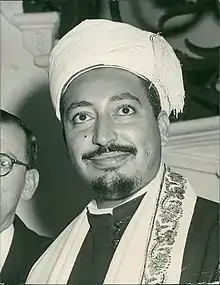 (1962–1970) | |
.jpg.webp) |
Hassan ibn Yahya (1908–2003) |
October 1962 | 11 April 1967 | 4 years, 6 months | Independent | ||
 |
Abdur Rahman ibn Yahya (born 1937) |
April 1967 | 15 January 1969 | 1 year, 9 months | Independent | ||
.jpg.webp) |
Hassan ibn Yahya (1908–2003) |
15 January 1969 | 1 December 1970 | 1 year, 320 days | Independent | ||
Yemen Arab Republic (1962–1990)
- Status
| Portrait | Prime Minister (Birth–Death) |
Term of office | Political party | President(s) (Term) | ||||
|---|---|---|---|---|---|---|---|---|
| Took office | Left office | Time in office | ||||||
 |
Abdullah al-Sallal (1917–1994) |
28 September 1962 | 26 April 1963 | 210 days | Military | Abdullah al-Sallal (1962–1967) | ||
.jpg.webp) |
Abdul Latif Dayfallah (1930–2019) |
26 April 1963 | 5 October 1963 | 162 days | Military | |||
 |
Abdul Rahman al-Eryani (1910–1998) |
5 October 1963 | 10 February 1964 | 128 days | Independent | |||
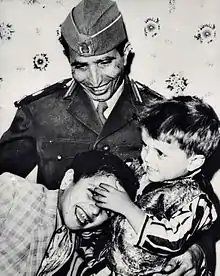 |
Hassan al-Amri (1920–1989) |
10 February 1964 | 29 April 1964 | 79 days | Military | |||
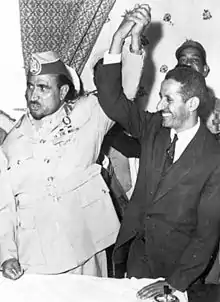 |
Hamoud al-Gayifi (1918–1985) |
29 April 1964 | 6 January 1965 | 252 days | Independent | |||
 |
Hassan al-Amri (1920–1989) |
6 January 1965 | 20 April 1965 | 104 days | Military | |||
.jpg.webp) |
Ahmad Muhammad Numan (1909–1996) |
20 April 1965 | 6 July 1965 | 77 days | Independent | |||
 |
Abdullah al-Sallal (1917–1994) |
6 July 1965 | 21 July 1965 | 15 days | Military | |||
 |
Hassan al-Amri (1920–1989) |
21 July 1965 | 18 September 1966 | 1 year, 59 days | Military | |||
 |
Abdullah al-Sallal (1917–1994) |
18 September 1966 | 5 November 1967 (deposed.) |
1 year, 48 days | Military | |||
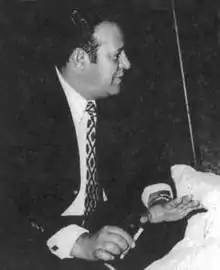 |
Mohsin Ahmad al-Aini (1932–2021) |
5 November 1967 | 21 December 1967 | 46 days | Independent | Abdul Rahman al-Iryani (1967–1974) | ||
 |
Hassan al-Amri (1920–1989) |
21 December 1967 | 9 July 1969 | 1 year, 200 days | Military | |||
 |
Abdul Salam Sabrah (1912–2012) |
9 July 1969 | 29 July 1969 | 20 days | Independent | |||
 |
Mohsin Ahmad al-Aini (1932–2021) |
29 July 1969 | 2 September 1969 | 35 days | Independent | |||
 |
Abdullah Kurshumi (1932–2007) |
2 September 1969 | 5 February 1970 | 156 days | Independent | |||
 |
Mohsin Ahmad al-Aini (1932–2021) |
5 February 1970 | 26 February 1971 | 1 year, 21 days | Independent | |||
 |
Abdul Salam Sabrah (1912–2012) |
26 February 1971 | 3 May 1971 | 66 days | Independent | |||
.jpg.webp) |
Ahmad Muhammad Numan (1909–1996) |
3 May 1971 | 24 August 1971 | 113 days | Independent | |||
 |
Hassan al-Amri (1920–1989) |
24 August 1971 | 5 September 1971 | 12 days | Military | |||
 |
Abdul Salam Sabrah (1912–2012) |
5 September 1971 | 18 September 1971 | 13 days | Independent | |||
 |
Mohsin Ahmad al-Aini (1932–2021) |
18 September 1971 | 30 December 1972 | 1 year, 103 days | Independent | |||
 |
Abdullah al-Hagri (1911–1977) |
30 December 1972 | 10 February 1974 | 1 year, 42 days | Independent | |||
 |
Hassan Muhammad Makki (1933–2016) |
10 February 1974 | 22 June 1974[lower-alpha 1] | 132 days | Independent | |||
 |
Mohsin Ahmad al-Aini (1932–2021) |
22 June 1974 | 16 January 1975 | 208 days | Independent | Ibrahim al-Hamdi (1974–1977) | ||
.jpg.webp) |
Abdul Latif Dayfallah (1930–2019) |
16 January 1975 | 25 January 1975 | 9 days | Military | |||
 |
Abdul Aziz Abdul Ghani (1939–2011) |
25 January 1975 | 15 October 1980 | 5 years, 264 days | Independent | |||
Ahmad al-Ghashmi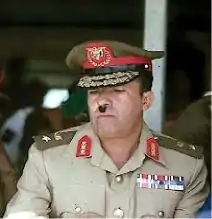 (1977–1978) | ||||||||
Abdul Karim Abdullah al-Arashi (1978) | ||||||||
Ali Abdullah Saleh_(cropped).jpg.webp) (1978–1990) | ||||||||
 |
Abd Al-Karim Al-Iryani (1934–2015) |
15 October 1980 | 13 November 1983 | 3 years, 29 days | Independent (until 24 August 1982.) | |||
| General People's Congress | ||||||||
 |
Abdul Aziz Abdul Ghani (1939–2011) |
13 November 1983 | 22 May 1990[7] | 6 years, 190 days | General People's Congress | |||
People's Democratic Republic of Yemen (1967–1990)
| Portrait | Prime Minister (Birth–Death) |
Term of office | Political party | Heads of state (Term) | ||||
|---|---|---|---|---|---|---|---|---|
| Took office | Left office | Time in office | ||||||
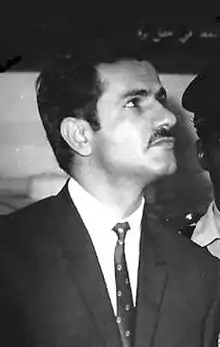 |
Faysal al-Shaabi (1935–1971) |
6 April 1969 | 22 June 1969 (deposed.)[8] |
77 days | National Liberation Front | Qahtan Muhammad al-Shaabi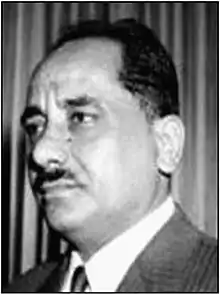 (1967–1969) | ||
 |
Muhammad Ali Haitham (1940–1993) |
23 June 1969 | 2 August 1971 | 2 years, 40 days | National Liberation Front | Salim Rubai Ali.JPG.webp) (1969–1978) | ||
.jpg.webp) |
Ali Nasir Muhammad (born 1939) |
2 August 1971 | 14 February 1985 | 13 years, 196 days | National Liberation Front (until 21 December 1978.) | |||
Ali Nasir Muhammad.jpg.webp) (1978) | ||||||||
| Yemeni Socialist Party | Abdul Fattah Ismail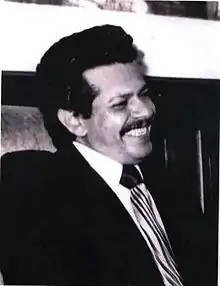 (1978–1980) | |||||||
Ali Nasir Muhammad.jpg.webp) (1980–1986) | ||||||||
 |
Haidar Abu Bakr al-Attas (born 1939) |
14 February 1985 | 8 February 1986 | 359 days | Yemeni Socialist Party | |||
 |
Yasin Said Numan (born 1948) |
8 February 1986 | 22 May 1990[7] | 4 years, 103 days | Yemeni Socialist Party | Haidar Abu Bakr al-Attas (1986–1990) | ||
Democratic Republic of Yemen (1994)
| Portrait | Prime Minister (Birth–Death) |
Term of office | Political party | President (Term) | ||||
|---|---|---|---|---|---|---|---|---|
| Took office | Left office | Time in office | ||||||
 |
Haidar Abu Bakr al-Attas (born 1939) (in rebellion) |
21 May 1994[9] | 7 July 1994[10] | 47 days | Yemeni Socialist Party | Ali Salem al Beidh.jpg.webp) (1994) | ||
Republic of Yemen (post-unification, 1990–present)
- Status
| Portrait | Prime Minister (Birth–Death) |
Term of office | Political party | President(s) (Term) | ||||
|---|---|---|---|---|---|---|---|---|
| Took office | Left office | Time in office | ||||||
 |
Haidar Abu Bakr al-Attas (born 1939) |
22 May 1990 | 9 May 1994 (deposed.) |
3 years, 352 days | Yemeni Socialist Party | Ali Abdullah Saleh (1990–2012) | ||
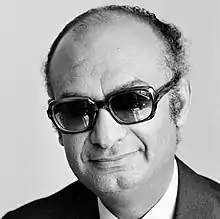 |
Muhammad Said al-Attar (1927–2005) |
9 May 1994 | 6 October 1994 | 150 days | Independent | |||
 |
Abdul Aziz Abdul Ghani (1939–2011) |
6 October 1994 | 14 May 1997 | 2 years, 220 days | General People's Congress | |||
 |
Faraj Said Bin Ghanem (1937–2007) |
14 May 1997 | 29 April 1998 | 350 days | Independent | |||
 |
Abd Al-Karim Al-Iryani (1934–2015) |
29 April 1998 | 31 March 2001 | 2 years, 336 days | General People's Congress | |||
 |
Abdul Qadir Bajamal (1946–2020) |
31 March 2001 | 7 April 2007 | 6 years, 7 days | General People's Congress | |||
 |
Ali Muhammad Mujawar (born 1953) |
7 April 2007 | 10 December 2011 (resigned.) |
4 years, 247 days | General People's Congress | |||
.jpg.webp) |
Mohammed Basindawa (born 1935) |
10 December 2011 | 24 September 2014 (resigned.)[11] |
2 years, 288 days | Independent | Abdrabbuh Mansur Hadi (2012–2022) | ||
 |
Abdullah Mohsen al-Akwa (born 1961) |
24 September 2014 | 9 November 2014 | 46 days | Al-Islah | |||
.jpg.webp) |
Khaled Bahah (born 1965) |
9 November 2014 | 3 April 2016 | 1 year, 146 days | Independent | |||
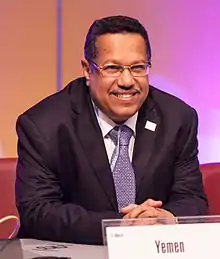 |
Ahmed Obaid Bin Dagher (born 1952) |
4 April 2016 | 15 October 2018 | 2 years, 195 days | General People's Congress | |||
.jpg.webp) |
Maeen Abdulmalik Saeed (born 1976) |
18 October 2018 | Incumbent | 5 years, 9 days | Independent | |||
Rashad al-Alimi.jpg.webp) (since 2022) | ||||||||
| Supreme Political Council (Houthis) | ||||||||
 |
Talal Aklan (born 19??)[lower-alpha 2] (in rebellion) |
1 March 2016 | 4 October 2016 | 217 days | Yemeni Socialist Party | Mohammed al-Houthi.png.webp) (2015–2016) | ||
 |
Abdel-Aziz bin Habtour (born 1955)[lower-alpha 2] (in rebellion) |
4 October 2016 | Incumbent | 7 years, 23 days | General People's Congress | Saleh Ali al-Sammad.png.webp) (2016–2018) | ||
Mahdi al-Mashat.png.webp) (since 2018) | ||||||||
Timeline
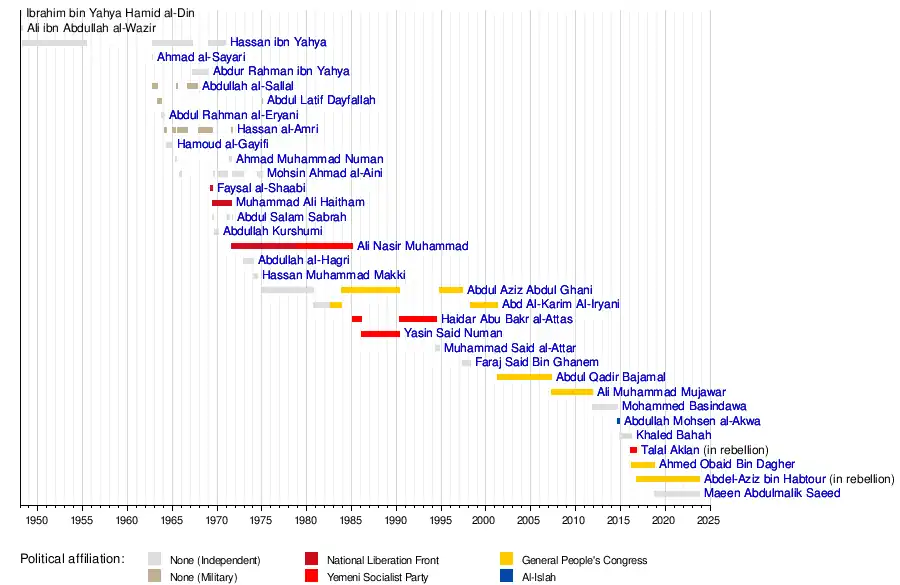
See also
Notes
- Dismissed following a coup d'état.
- Appointed by the Houthis, in rebellion during their takeover and its aftermath.
References
- James L. Gelvin (2012). The Arab Uprisings: What Everyone Needs to Know. Oxford University Press. p. 68. ISBN 978-0-19-989177-1.
- Mareike Transfeld (2014). "Capturing Sanaa: Why the Houthis Were Successful in Yemen". Muftah. Retrieved 17 October 2014.
- Steven A. Zyck (2014). "Mediating Transition in Yemen: Achievements and Lessons" (PDF). International Peace Institute. Retrieved 17 October 2014.
- Silvana Toska (26 September 2014). "Shifting balances of power in Yemen's crisis". The Washington Post. Retrieved 24 October 2014.
- "Houthi leader vows to defend 'glorious revolution'". Al Jazeera. 8 February 2015. Retrieved 7 February 2015.
- Aboueldahab, Noha. "Yemen's fate was sealed six years ago". www.aljazeera.com.
- "2 Yemens Become One, and Celebrate". New York Times. Reuters. 23 May 1990. Retrieved 6 May 2022.
- "Southern Yemen's President Quits and Council Replaces Him". New York Times. 23 June 1969. Retrieved 6 May 2022.
- "Southern Yemenis Announce Secession". New York Times. Reuters. 22 May 1994. Retrieved 6 May 2022.
- "Yemen Claims Victory in Civil War After Seizing Rebel City". New York Times. Associated Press. 8 July 1994. Retrieved 6 May 2022.
- "Yemen PM quits amid rebel clashes". BBC News. 21 September 2014. Archived from the original on 21 September 2014. Retrieved 21 September 2014.
